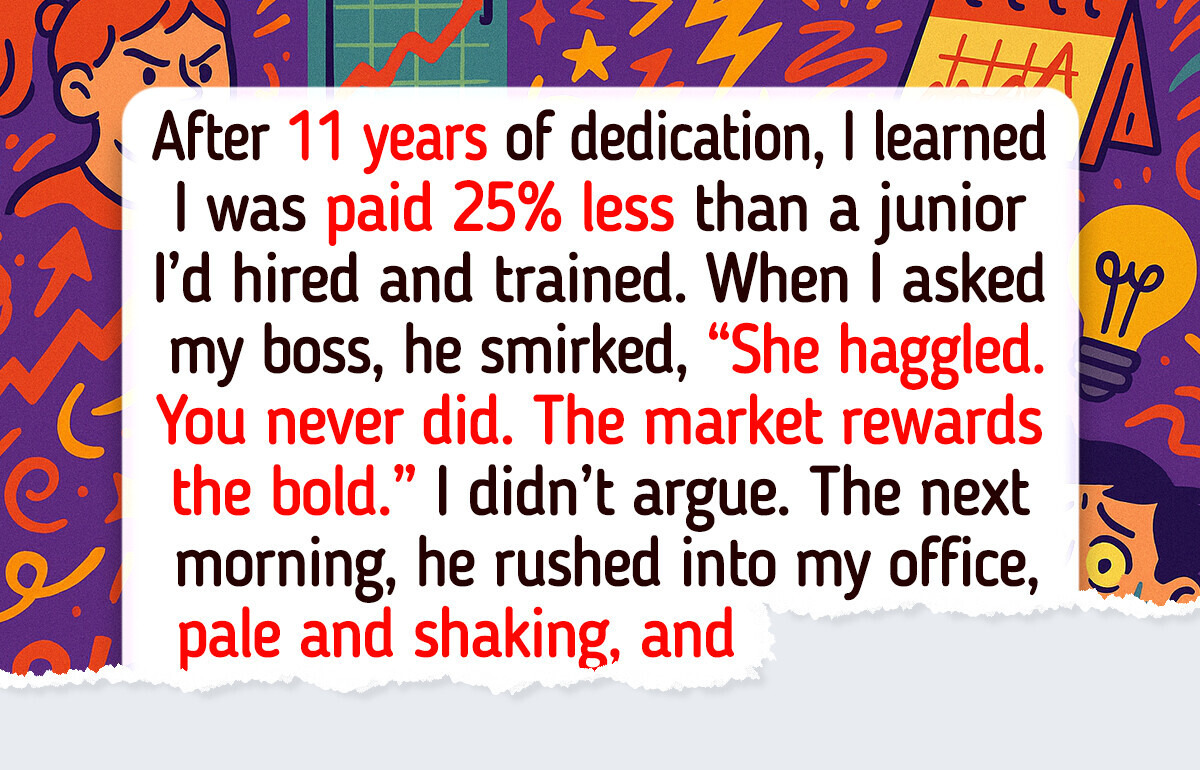Congratulations
I Refused to Be Paid Less Than a Newbie — I Deserve Respect, Not Pity

Our jobs aren’t only defined by the tasks we perform, but also by how we’re treated and the lessons we gather along the way. Every now and then, an experience comes along that reshapes how we view our career — and even ourselves. Recently, one of our readers reached out to tell us about such a defining moment.
Here’s Jason’s letter:
Hi Now I’ve Seen Everything!
After 11 years of dedication as a senior project manager, I discovered I was earning 25% less than a junior employee I had personally hired and trained. When I confronted my boss, he smirked and said, “She haggled. You never did. The market rewards the bold.” I didn’t argue.
The next morning, I arrived at the office before anyone else and quietly submitted my resignation to HR — but not before doing one small thing. I transferred every major client contact I’d brought in over the years to my personal phone. They trusted me, not the company.
That evening, I called each of them — calm, polite, and professional — to let them know I was joining a new firm, one that actually valued experience and competence. I’d received an offer from that firm months earlier, but out of loyalty, I had turned it down. I thought I owed my company more. Turns out, I was wrong.
By morning, three of the company’s biggest clients had called my boss to inform him they’d be following me. When he realized what had happened, he called me in a panic, his voice full of anger. I simply laughed and said, “You were right — the market belongs to the bold.” Then I hung up.
Moments later, he rushed to my office, pale and shaking, begging me to reconsider my resignation. I smiled and said quietly, “I think it’s already too late.”
Ten minutes later, HR called me in. They handed me a new contract — a 40% salary increase, a hefty bonus, and a promise of promotion to Head of Operations if I agreed to stay. They said the company had “reconsidered my value.”
I could see the tension in their faces. Suddenly, I mattered. I should’ve felt triumphant, but instead, all I felt was exhaustion. Why did it take walking away for them to finally recognize my worth?
Now, the new contract sits on my desk. The paper looks sleek and expensive, yet to me, it feels more like guilt disguised as generosity. The other company — the one I was ready to join — isn’t massive, but its people are genuine. They want me for what I can do, not because they’re afraid to lose me.
And so, I’m torn. Do I stay where the money is, or go where the respect is?
If you were in my place, what would you choose?
— Jason.
Thank you, Jason, for sharing your story and trusting us with such a powerful, honest experience. Your situation resonates with so many people who’ve faced the same difficult crossroads in their careers. Below are four different pieces of advice that might help you — and anyone in a similar position — view things from fresh perspectives.
The Practical Path.
Big decisions call for clear minds, not impulsive reactions. Lay both offers out side by side — salary, benefits, stability, growth opportunities, and how each aligns with your five-year goals.
Loyalty is commendable, but the most important loyalty is to yourself. If the new company offers space to grow, learn, and feel valued, that’s the kind of opportunity that truly matters. Choose the path that represents progress, not patchwork.
Respect Isn’t a Reward.
If a company only values you when you threaten to leave, it’s not respect — it’s damage control. Real appreciation shows up in fair pay, support, and recognition long before you resign. The raise may fix the money problem, but it can’t erase years of being undervalued.
You’ve already seen how they truly see you — as replaceable until proven otherwise. Sometimes, walking away is the only way to keep your self-respect intact.
The Strength in Staying Smart.
Before you walk out, remember that emotions can blur strategy. You now have power — use it wisely. If you decide to stay, do it not out of guilt, but because you can shape your position into what you deserve.
Negotiate every promise in writing and ask for measurable goals tied to your promotion. Sometimes, staying a little longer on your terms can open even bigger doors later.
Follow the Energy, Not the Ego.
You’ve already shown your value — to the company and, more importantly, to yourself. Now, the question isn’t about the paycheck; it’s about peace of mind.
Ask yourself where you feel genuinely motivated — in a place that responds out of fear or one that recognized your worth from the start. The right workplace should energize you, not exhaust you. Go where you’re appreciated, not merely accommodated.
When life feels unbearably heavy and hope begins to fade, kindness has a quiet power to let the light in again.
Comments
Related Reads
Study Reveals Men and Women Prefer Different Lip Sizes, Sparking Heated Debate

14 Photos of Celebrities and Their Kids at the Same Age That Are Hard to Believe

10 Celebrities Who Removed Fillers and Left Everyone Speechless

17 Сelebrity Сhildren Whose Looks Are Just as Striking as Their Star Parents

11 Celebrities Who Look Strikingly Different in Social Media Pics vs. Professional Shots

From “Most Beautiful Twins” to Teen Stars — See Their Transformation Today

13 Unbelievable Stories of People Who Uncovered Their Lover’s Dark Secrets

15 Celebrities Who Shine On The Red Carpet But Are Shockingly Normal in Real Life

Baby Girl With a Rare Smile Grew Up — What She Looks Like Today Will Leave You Speechless

12 Stories of Hidden Truths That Rocked Families Forever

5 Alarming Signs of Colon Cancer You Might Be Missing

20 Most Beautiful Women, Chosen by Everyday People





